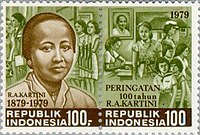
| Part of a series on |
| Feminism |
|---|
 |
|
|
Feminism in Indonesia refers to the long history of discourse for gender equality to bring about positive social change in Indonesia.[1] The issues women in Indonesia currently are facing include gender violence, underage marriages, and lack of representation in the political system.[2] Feminism and the women's right movement began during colonial Indonesia under Dutch rule and were spearheaded by the national heroine Kartini,[1][3] a Javanese noblewoman who advocated for the education of all women and girls regardless of social status.[3] In the early 19th century, women's rights organizations and movements were allowed to developed under Budi Utomo, the first Indonesian Nationalist organization.[4][1] Modern day Indonesian feminism include and are influenced by both fundamentalist and progressive Islamic women's organizations.[5]
According to the 2020 Gender Gap Index measurement of countries by the World Economic Forum, Indonesia is ranked 85th on gender equality.[6]
- ^ a b c "A Hundred Years of Feminism in Indonesia". www.fes-asia.org. Archived from the original on 2020-11-24. Retrieved 2020-10-01.
- ^ "Feminism In Indonesia: The Challenges Women Face In The Struggle For Equal Rights". Yonah Channel. 2018-04-10. Archived from the original on 2021-02-12. Retrieved 2020-10-03.
- ^ a b Cite error: The named reference
:9was invoked but never defined (see the help page). - ^ Printina, Sanata (23 February 2019). "The Roles of Budi Utomo in Women's Organization Movements in 1928-1940". International Journal of Humanity Studies. 2 (2): 204–214. doi:10.24071/ijhs.v2i2.1699. S2CID 248358053.
- ^ Robinson, Kathryn (2006-01-01). "Islamic Influences on Indonesian Feminism". Social Analysis. 50 (1). doi:10.3167/015597706780886012. ISSN 0155-977X.
- ^ "Global Gender Gap Report 2020" (PDF). World Economic Forum.